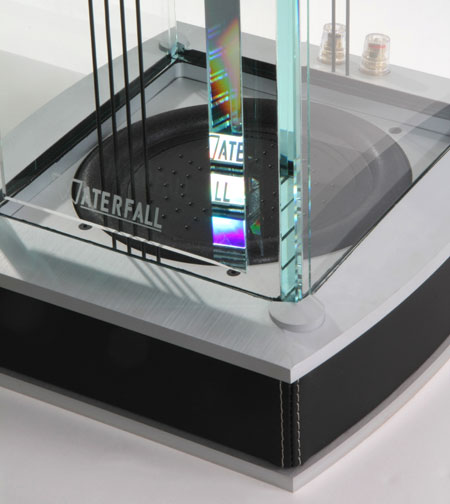Glass Act


Sitting atop the nearly 4-foot-tall cabinet is a glass-horn tweeter with a 0.79-inch silk-dome driver made by Atohm, which supplies all of Waterfall's driver units. The entire horn structure is completely decoupled from the rest of the cabinet, including the crossover that resides in an aluminum box behind the driver.

Two 7-inch midbass cone drivers include Waterfall's ADT (Acoustic Damping Tube) technology, which optimizes their performance in the sealed, non-damped enclosure by limiting the return of the backwave to the cone, thus reducing distortion. One of these drivers reproduces the frequency range from 35Hz to 300Hz while the other one extends from 35Hz to 1500Hz, making this a "2½-way" design.

The lowest frequencies are assisted by a passive 8-inch radiator in the aluminum base that fires through an opening at the back, so don't put these speakers up against a wall! The radiator is tuned to resonate at about 35Hz, adding energy to the midbass drivers' low end, which is not damped by the ADT structure. I'm a bit skeptical of a passive radiator tuned to a specific frequency—it seems to me that this would result in "one-note bass" rather than a smooth continuum of low frequencies, but Waterfall claims an overall frequency response from 36Hz to 28kHz, ±3dB.

The sealed cabinet is made of 0.6-inch-thick "diamond glass," a unique formulation fabricated in a special process that results in ultra-clear glass with no green coloration, allowing the Niagara to essentially disappear into any decor. As you might expect, this material is very expensive, which, along with many other technical innovations, leads to a retail price of $54,000/pair—not inexpensive, to be sure, but worth it if they sound as good as they look.
- Log in or register to post comments



























































